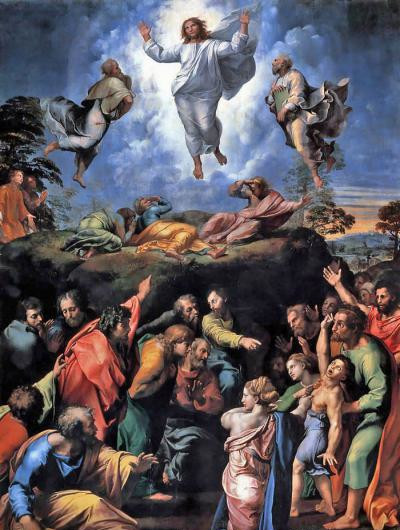
Saint of the Day for 6 August: Transfiguration of the Lord
A Divine Moment of Glory and Revelation in the Harmony of Salvation
Name
Transfiguration of the Lord
Title
Jesus reveals the Body of the True Man to the three beloved disciples
Recurrence
06 August
Martyrology
2004 edition
Prayer
We give you thanks, Supreme Trinity, we give you thanks, true unity, we give you thanks, unique goodness, we give you thanks, most sublime divinity. Let man give thanks to you, your humble creature and your sublime image. Give thanks to thee, because thou didst not abandon him to death, but didst snatch him from the abyss of perdition, and pourest forth thy mercy upon him in torrents. Let him sacrifice to thee the sacrifice of praise, let him offer to thee the incense of his dedication, let him consecrate to thee holocausts of jubilation. O Father, you sent us the Son; O Son, you became incarnate in the world; O Holy Spirit, you were present in the Virgin who conceived, you were present at the Jordan, in the dove, you are today on Tabor, in the cloud. All Trinity, invisible God, you cooperate in the salvation of men so that they may be saved by your divine power.
Patron of
Seriate, Sona, Lonigo, Cefalù, Margherita di Savoia, Succivo, Militello in Val di Catania, Brugine, Palmanova, Comun Nuovo
Roman Martyrology
Feast of the Transfiguration of the Lord, on which Jesus Christ, the Only-Begotten Son, the Beloved of the Eternal Father, before the holy Apostles Peter, James and John, having as witnesses the law and the prophets, manifested his glory, to reveal that our humble condition of servants assumed by him had been by grace gloriously redeemed, and to proclaim to the ends of the earth that the image of God, according to which man was created, though corrupted in Adam, had been recreated in Christ.
The Saint and Mission
The Transfiguration of the Lord is a significant event that not only reveals Christ’s divine glory, but also sheds light on his missionary journey on earth. On Mount Tabor, before Peter, James and John, Christ is transfigured, displaying his heavenly glory and confirming his role as the promised Messiah. The presence of Moses and Elijah, representatives of the Law and the Prophets, emphasises the connection between the Old Testament and Christ’s redemptive mission in the New Testament. But beyond the revelation of his divinity, the Transfiguration is also a crucial moment of preparation and confirmation for the disciples. Jesus is preparing them for his imminent suffering, death and resurrection. He is leading them to understand that his mission is not that of an earthly conqueror, but of a suffering Saviour who will bring redemption through love and sacrifice. The voice of the Father proclaiming “This is my beloved Son, listen to him!” is a mandate directed not only to the three disciples present, but to all believers, to follow Christ and to continue his mission of love and salvation in the world. The Transfiguration, therefore, is not only a manifestation of Christ’s divinity; it is a key moment that underlines the nature of Jesus’ mission and the call to participate in this mission. It is an invitation to share the message of redemption, to live a life of authentic discipleship, and to witness to the light of Christ in a world in need of hope and salvation. In short, it is a mission model that guides and inspires the Church in its ongoing journey of evangelisation.
The Saint and Mercy
The Transfiguration of the Lord is a key event in the New Testament that reveals the divine nature of Christ, manifesting his glory before the disciples Peter, James and John on Mount Tabor. But beyond the glory and majesty, there is also a profound message of mercy in this revelation. The presence of Moses and Elijah, representatives of the Law and the Prophets, together with Jesus, symbolises the continuity between the Old and New Testaments. It indicates that Jesus did not come to abolish the Law but to bring it to fulfilment, and it is in this fulfilment that God’s mercy resides. The Transfiguration reveals that Jesus’ mission is a mission of mercy, a call to reconcile humanity with God through his passion, death and resurrection. The vision of his glory is not only a revelation of his divinity, but also an anticipation of the hope and redemption he offers to all who believe in him. Moreover, the disciples’ experience on Mount Tabor, though pervaded by fear and wonder, becomes a reassurance of God’s love and care. Jesus invites them not to fear, showing his compassion and human understanding. The Transfiguration of the Lord is not only a mystical event that reveals the divine nature of Christ, but also a powerful manifestation of God’s mercy. It reveals a God who is not distant or inaccessible, but close, loving and eager to redeem humanity through the saving work of his Son. It is an invitation to respond to divine mercy with faith and trust, following the example of Christ, the face of the Father’s mercy.
Hagiography
The Divine Redeemer Jesus had already preached the Gospel of love throughout Palestine for two years, and he had already chosen his twelve Apostles, but the Good News was still only partially understood: his disciples themselves still remained doubtful and lukewarm. To confirm in the faith at least the most beloved of the Apostles, he took with him Peter, James and John, led them to the summit of Tabor and…
